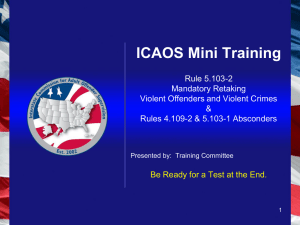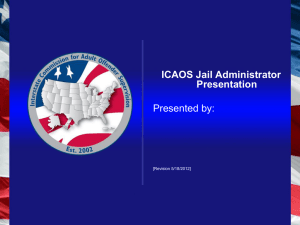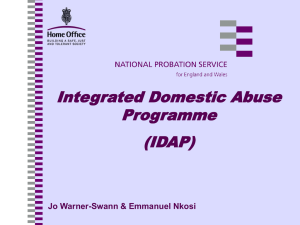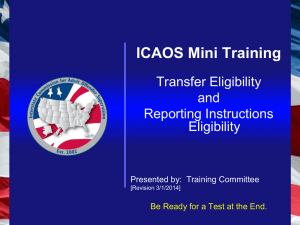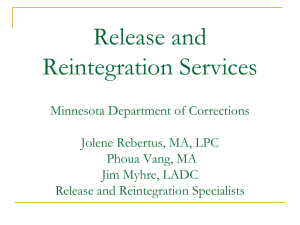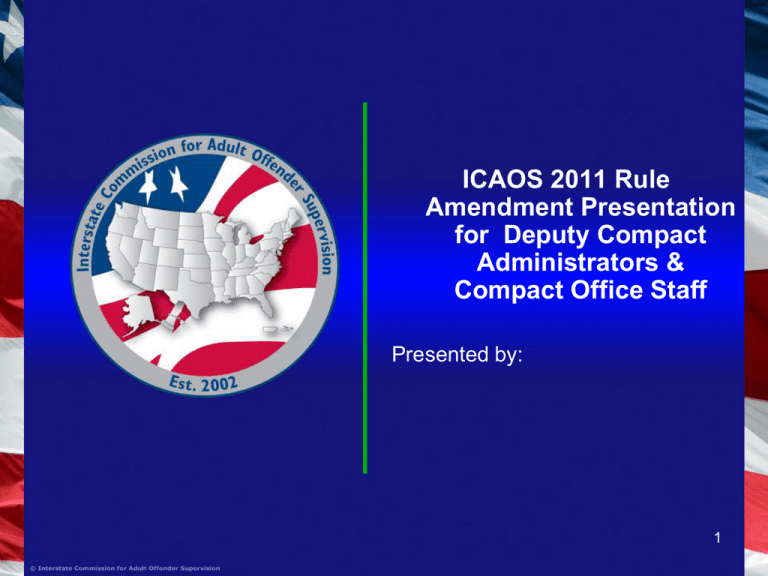
ICAOS 2011 Rule
Amendment Presentation
for Deputy Compact
Administrators &
Compact Office Staff
Presented by:
1
“Warrant” Definition
• “Warrant” means a written order of the court or
authorities of a sending or receiving state or
other body of competent jurisdiction which is
made on behalf of the state, or United States,
issued pursuant to statute and/or rule and which
commands law enforcement to arrest an
offender. The warrant shall be entered in the
National Crime Information Center (NCIC)
Wanted Person File with a nationwide pick-up
radius.
Impact of Warrant Definition
• The word warrant has appeared in the
interstate compact rules for years yet it
has never been defined. This definition
will help clarify and define what type of
warrant must be issued when warrants are
required under the interstate compact
rules.
Rule 5.101 Amendment
Retaking by the sending state
• (B) Upon its determination to retake the
offender, the sending state shall issue a
warrant and, upon apprehension of the
offender, file a detainer with the holding
facility where the offender is in custody.
Impact of 5.101 Amendment
• Mandates that a warrant be issued to
retake an offender once the determination
is made to do so.
• Also clarifies and reminds states to file a
detainer if separate from the warrant
• Does not remove the ability to order the
return of an offender except where
mandated to retake.
Rule 5.102 Amendment
Mandatory retaking for a new felony
conviction
• (a) Upon a request from the receiving state, a
sending state shall retake an offender……upon
the offender’s conviction for a new felony
offense….
• (b) When a sending state is required to retake
an offender, the sending state shall issue a
warrant and, upon apprehension of the offender,
file a detainer with the holding facility where the
offender is in custody.
Impact of 5.102 Amendment
• Removes the sending state’s ability to
order the return of an offender under this
rule and mandates that a warrant be
issued to retake an offender
• Also clarifies and reminds states to file a
detainer if separate from the warrant
New Rule 5.103-2
Mandatory Retaking for violent
offenders and violent crimes
• (A) Upon a request from the receiving state, a
sending state shall retake a violent offender who
has committed a significant violation
• (B) Upon a request from the receiving state, a
sending state shall retake an offender who is
convicted of a violent crime
• (C) When a sending state is required to retake
an offender, the sending state shall issue a
warrant and, upon apprehension of the offender,
file a detainer with the holding facility where the
offender is in custody.
Impact of New Rule 5.103-2
• Under (A): A sending state is mandated to
retake a “violent offender” by issuing a
warrant if the receiving state requests it
after notifying the sending state of the
commission of a significant violation via a
violation report
Impact of New Rule 5.103-2
• Under (B): A sending state is mandated to
retake an “offender” by issuing a warrant if
the receiving state requests it after
notifying the sending state about a
conviction for a “violent crime” via a
violation report
• Under (C): The warrant issued must meet
the compact definition of warrant.
“Violent Offender” and
“Violent Crime” Definitions
• “Violent Offender” means an offender under supervision
for a violent crime.
• “Violent Crime” means any crime involving the unlawful
exertion of physical force with the intent to cause injury
or physical harm to a person; OR an offense in which a
person has incurred direct or threatened physical or
psychological harm as defined by the criminal code of
the state in which the crime occurred; OR the use of a
deadly weapon in the commission of a crime; OR any
sex offense requiring registration
Impact of New Definitions:
During the Violation/Retaking Process
• It will be the receiving state’s responsibility
to demonstrate if an offender has been
convicted of a new violent crime as
defined by the compact.
Impact of New Definitions:
During the Transfer Request Process
• If it is unclear whether the offender is
under supervision for a violent crime:
– The Training Committee recommends that
receiving states request clarification during
the investigation.
– Consistent with Rule 3.104, Time allowed for
investigation by the receiving state, requests
for clarification will not be a basis to delay the
reply to the transfer request.
New Rule 5.103-2
Mandatory Retaking for violent
offenders and violent crimes
• (A) Upon a request from the receiving state, a
sending state shall retake a violent offender who
has committed a significant violation
• (B) Upon a request from the receiving state, a
sending state shall retake an offender who is
convicted of a violent crime
• (C) When a sending state is required to retake
an offender, the sending state shall issue a
warrant and, upon apprehension of the offender,
file a detainer with the holding facility where the
offender is in custody.
Violation Report
Rule 4.109 Amendment
• Language about the sending state’s
responsibilities regarding absconders was
struck in (c) (3) and (4). This language
was revised and moved to new Rules
4.109-2 and 5.103-1.
Impact of 4.109 Amendment
• Creates a new absconder rule 4.109-2 that
provides clarity to the receiving state’s
responsibilities to report an absconder and
creates new rule 5.103-1 that speaks
specifically to the retaking process for
absconders.
New Rule 4.109-2
Absconding Violation
• (a) If there is reason to believe that an offender
has absconded, the receiving state shall attempt
to locate the offender. Such activities shall
include, but are not limited to:
– (1) Conducting a field contact at the last known place
of residence;
– (2) Contacting the last known place of employment; if
applicable;
– (3) Contacting known family members and collateral
contacts.
(b) If the offender is not located, the receiving
state shall submit a VR pursuant to Rule
4.109(b)(9)
Impact of New Rule 4.109-2
• Sets and clarifies the responsibilities of the
receiving state to determine that an
offender absconded, prior to submitting a
violation report
• Refers the reader to rule 4.109 (b) (9) so
that details are provided in the VR
New Rule 5.103-1
Mandatory retaking for offenders who abscond
• (a) Upon receipt of an absconder violation report and case closure,
the sending state shall issue a warrant and, upon apprehension of
the offender, file a detainer with the holding facility where the
offender is in custody.
• (b) If an offender who has absconded is apprehended on a sending
state’s warrant within the jurisdiction of the receiving state that
issued the violation report and case closure, the receiving state
shall, upon request by the sending state, conduct a probable cause
hearing as provided in rule 5.108 (d) and (e) unless waived as
provided in rule 5.108 (b).
• (c) Upon a finding of probable cause the sending state shall retake
the offender from the receiving state.
• (d) If probable cause is not established, the receiving state shall
resume supervision upon the request of the sending state.
• (e) The sending state shall keep its warrant and detainer in place
until the offender is retaken pursuant to paragraph (c) or supervision
is resumed pursuant to paragraph (d).
Impact of New Rule 5.103-1
• Clarifies the following:
– Sending state must issue a warrant and file a detainer
for an absconder upon receipt of the VR and closure
– Receiving state’s responsibilities for conducting a
probable cause hearing after apprehension and if
requested to hold one
– Sending state’s responsibility to retake after finding of
probable cause (if hearing was conducted)
– Receiving state’s responsibilities for resuming
supervision if a hearing was held and probable cause
was not established
– Sending states cannot dismiss or cancel their warrant
until the offender is retaken to the sending state or
supervision is resumed under paragraph (d)
Transfer Request
Rule 3.107 Amendment
• (a) (2) A narrative description of the instant
offense in sufficient detail to describe the
circumstances;
• (a) (8) pre-sentence investigation report, unless
distribution is prohibited by law or it does not
exist;
• (a) (9) supervision history, unless it does not
exist
• (c) Additional documents, following acceptance,
necessary for supervision in the receiving
state….sending state shall provide within 30
calendar days from date of request
Impact of 3.107 Amendment
• The changes to 3.107 accomplish 4
things:
1. Clarifies the need for a narrative description of the
instant offense.
2. Makes the inclusion of an existing pre-sentence
report MANDATORY, unless distribution is prohibited
by law.
3. Stresses the requirement of the inclusion of an
existing supervision history.
4. Provides a deadline for the sending state to provide
additional information when requested that will assist
the receiving state in effective supervision of an
accepted offender.
Effective Date of all
Amendments
• March 1, 2011
• Materials requiring update
– Rule presentations
– On Demand Modules
– Bench book for Judges
– ICAOS Rules
– Training Bulletins (minor)
– Audit Standards
Rules Training
• Technical & Training Assistance can be
requested through Commissioner
• Regular Webex sessions anticipated to
resume February
– Open registration
Contact
• Interstate Commission for
Adult Offender Supervision
PO Box 11910
Lexington KY 40578-1910
(859) 244-8008 Phone
(859) 244-8001 Fax
• Commission Website
www.interstatecompact.org


